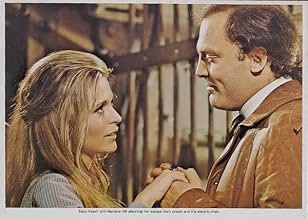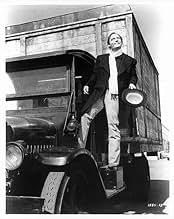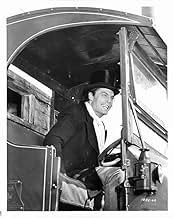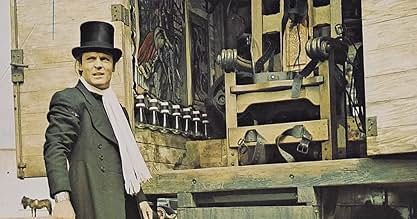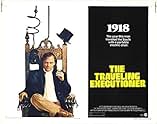Aggiungi una trama nella tua linguaStacy Keach is electrifying as Jonas Candide, an ex-carny who in 1918 travels around the bayou with a portable electric chair. At $100 a head, he renders his services with loving care. But t... Leggi tuttoStacy Keach is electrifying as Jonas Candide, an ex-carny who in 1918 travels around the bayou with a portable electric chair. At $100 a head, he renders his services with loving care. But then he falls for a female "client".Stacy Keach is electrifying as Jonas Candide, an ex-carny who in 1918 travels around the bayou with a portable electric chair. At $100 a head, he renders his services with loving care. But then he falls for a female "client".
- Regia
- Sceneggiatura
- Star
- Gundred Herzallerliebst
- (as Mariana Hill)
- Piquant
- (as James J. Sloyan)
Recensioni in evidenza
Before Keach became a Hollywood hack (with the exception of Long Riders) he made a series of films that showed the tremendous promise he had on stage. After the TV show Caribe he seemed to slide into obscurity except for Mike Hammer. This is a charming film that slipped under the radar in 1970 and is well worth your time. An 8 out of 10.
I saw it just the once, on TV, about ten years ago, but it made a strong impression on me. Stacy Keach gives a very brilliant performance as that most paradoxical of beings: a likable, humane executioner. He is ably supported by Bud Cort who adds his undertaker character to the gallery of eccentric young men that were his early stock in trade.
I also recall the general atmosphere of levity, a failure to take the central theme of the movie - death - very seriously. This is possibly explained by the fact that in 1970 (or, more probably 1969, when the film is likely to have gone into production) the death penalty itself probably seemed to have become a permanent relic of the past, unlikely to be employed again as the United States joined most of the developed world in rejecting it de facto if not yet de jure. (This abolition was only confirmed in 1972, and was short lived, as it happened.) The movie - although much blacker in its comedy - has a similar feel to "Butch Cassidy and the Sundance Kid" (or its TV doppelgaenger, "Alias Smith and Jones"). In these, the Wild West had been somehow not merely domesticated, but suburbanised, and there was an overlay of late 60s/early 70s Southern Californian sensibilities on the period setting. "The Traveling Executioner" does something similar to the Deep South of the late 1910s.
The return of capital punishment in the U.S. in the late 1970s (and its mounting use in the 80s and 90s) is likely to distort the perceptions of those too young to remember the atmosphere of the time in which the movie was made, when its black humour appeared to be excused by the fact that the actual horrors of execution that it so lightheartedly depicted seemed unlikely to reappear.
This is a dark comedy. The music is comedy music, Keach's performance keeps you smiling and there are funny episodes. One example is the scene where Keach procures a van load of prostitutes to hire out to inmates so that he can raise some money for a ludicrous plan to bring the condemned Mariana Hill (Gundred) back to life after the event. Doctor Graham Jarvis (Brittle) is the doctor who Keach is relying on for this experiment that works with rats.
Out of the cast, other than Keach, the standout performance is by sadistic warden James Sloyan (Piquant). He is the blueprint for the character in "The Green Mile" (1999) – you'll know the one I mean. There are two things to take from this film. Firstly, women are trouble. Secondly, if anyone starts talking about the Field of Ambrosia to you, get out of there fast!
Keach's trademark facial scar is on full display here, not obscured by a mustache as it would be almost forevermore in later films. It adds something to the role, like a tiny crack in an otherwise perfect human statue. The film also features character actor Bud Cort in an early role.
The opening and finale scenes where Keach delivers Jonas' Fields of Ambrosia monologues are some of the best in 1970s cinema, and Jonas Candide is one of the great characters of Seventies film, he's a drunkard, a womanizer, a liar, a glutton, (the massive meal Candide sits down to eat after an execution has to be seen to be believed, massive plates of biscuits, Canadian bacon and Darwin knows what else) yet beneath it all he has a heart, Jonas, like the film, is darkly funny and darkly lovable.
Fantastically directed by Jack Smight, with a fine score by Jerry Goldsmith, and the seemingly only feature film screenplay credit by forgotten rebel screenwriter Garrie Bateson.
If there ever was a Traveling Time Traveler, a jump back into the wayback machine could correct the travesty of not nominating this film for Oscars for Best Actor, Best Director, Best Original Screenplay and Best Picture in 1970!
Lo sapevi?
- QuizThis was filmed at Alabama's then recently closed Kilby Prison off of Coliseum Blvd. in Montgomery. As part of an agreement with the state for filming rights, filmmakers were supposed to have demolished the prison's massive walls with pyrotechnics during/after the film. However, the walls were so thick, three charges failed to do the job, and their remnants stayed around for years afterwards.
- BlooperAn important plot point is the existence of a portable electric chair which makes the career of "traveling executioner" possible. Unfortunately, as shown in the movie, it can't work. To perform an execution Keach "starts" a big electric generator in his horse-drawn van. But the generator has no power source! At the time the story takes place the internal combustion engine was new and rudimentary. The only transportable source of mechanical power was the steam engine. There were no diesel powered generators. Of course a steam engine large enough to produce the necessary mechanical power to turn the electric generator would have been almost as large as the van and would have required hours to build up enough steam to do the job. Also, a substantial amount of coal to make the steam would be needed. In any case, no motive power is shown and this explains why there were likely no traveling electrocutionists. Why a remote prison would not simply hang convicted criminals is likewise not explained.
- Citazioni
Jonas Candide: [seduced by Gundred] Her ass is too good to fry!
- ConnessioniEdited into The Lost Empire (1984)
I più visti
- How long is The Traveling Executioner?Powered by Alexa
Dettagli
- Tempo di esecuzione
- 1h 35min(95 min)
- Mix di suoni
- Proporzioni
- 2.35 : 1


